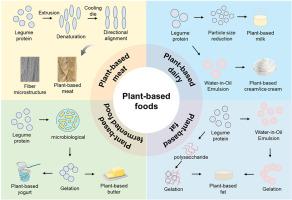Legumes as an alternative protein source in plant-based foods: Applications, challenges, and strategies
IF 6.2
2区 农林科学
Q1 FOOD SCIENCE & TECHNOLOGY
引用次数: 0
Abstract
Since animal proteins may pose a threat to the global environment and human health, the development of alternative proteins has become an inevitable trend in the future. Legumes are considered to be one of the most promising sources of sustainable alternative animal proteins. Legume proteins are considered to exhibit excellent processing properties, including emulsification, gelation, and foaming, which have led to their widespread use in the food industry. Moreover, legume proteins are not only taken as substitutes for meat proteins, they also play an essential role in novel plant-based foods (meat, dairy, fermented food, and fat). However, there are few comprehensive overview studies on the application of legume proteins in plant-based foods. Therefore, this review provides a general overview of the main sources, functional properties, and applications in plant-based foods of legume proteins. In addition, challenges to the application of legume proteins in plant-based foods and specific strategies to address these challenges are presented. The review may provide some references for the further application of legume proteins in novel plant-based foods.

豆类作为植物性食品中的替代蛋白质来源:应用、挑战和战略
由于动物蛋白可能对全球环境和人类健康构成威胁,开发替代蛋白已成为未来的必然趋势。豆类被认为是最有前景的可持续替代动物蛋白来源之一。豆类蛋白质被认为具有优良的加工性能,包括乳化、凝胶化和发泡,因此在食品工业中得到广泛应用。此外,豆类蛋白质不仅可作为肉类蛋白质的替代品,还在新型植物性食品(肉类、乳制品、发酵食品和脂肪)中发挥着重要作用。然而,有关豆类蛋白质在植物性食品中应用的全面综述研究很少。因此,本综述概述了豆类蛋白质的主要来源、功能特性以及在植物性食品中的应用。此外,还介绍了豆类蛋白质在植物性食品中应用所面临的挑战以及应对这些挑战的具体策略。本综述可为豆类蛋白质在新型植物性食品中的进一步应用提供一些参考。
本文章由计算机程序翻译,如有差异,请以英文原文为准。
求助全文
约1分钟内获得全文
求助全文
来源期刊

Current Research in Food Science
Agricultural and Biological Sciences-Food Science
CiteScore
7.40
自引率
3.20%
发文量
232
审稿时长
84 days
期刊介绍:
Current Research in Food Science is an international peer-reviewed journal dedicated to advancing the breadth of knowledge in the field of food science. It serves as a platform for publishing original research articles and short communications that encompass a wide array of topics, including food chemistry, physics, microbiology, nutrition, nutraceuticals, process and package engineering, materials science, food sustainability, and food security. By covering these diverse areas, the journal aims to provide a comprehensive source of the latest scientific findings and technological advancements that are shaping the future of the food industry. The journal's scope is designed to address the multidisciplinary nature of food science, reflecting its commitment to promoting innovation and ensuring the safety and quality of the food supply.
 求助内容:
求助内容: 应助结果提醒方式:
应助结果提醒方式:


